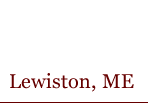






 |
 |
||||
 |
|||||
 |
|||||
 |
|||||
 |
|||||
 |
|||||
BCSG on Right Track
Tufaro's Article Correct, Revealing
Last Bastion of Political Incorrectness
Student Provides Connection to Bates from Abroad
Seeling Remembered, Honored by Former Student
Bates Hostile to Conservative Students' Opinions
Republicans Respond
Bush Lied? Join the Crowd
Clean, Renewable Energy A Possibility at Bates
The Revolution Will Not Be Televised
Can Bates Survive the Bottom Line?
By James Liddell
Opinion Writer

Have you been dying to know the main influences of our nation’s foreign
policy makers? If so, then there exists no better place to start than the
Windy City. At the University of Chicago, during the 1960s and 1970s, the
future crafters of our country’s foreign policy embarked on an intellectual
voyage. Under the guidance of some of the most influential thinkers of their
era, a new brand of thinking was established. The resulting philosophies,
based on moral clarity, mass deception, and mathematical military risk assessment,
have since prevailed and their tenets have won out in the White House.
Enter Leo Strauss, a German political philosopher who made his mark at Chicago.
Strauss had many beliefs he held dear, but it is his differentiated knowledge
of philosophy that makes Strauss such a hot conversational piece today. This
philosophy derives from his (some say perverse) interpretation of Plato. Strauss
believed in two different truths—the “exoteric” and “esoteric.”
The esoteric knowledge consists of the essential truths, or “political
realities” that exist in the world. These truths should be kept in a
tight intellectual circle where they would be used to embrace and foster the
insights of only those privileged enough to be “in the know.”
For the rest of us, there is the “exoteric knowledge” (read: lies)
that is disseminated to the general public in doses and substance in congruence
with our “outsider” status and inferiority. Following this logic,
Strauss believed in telling the “noble lie” in order to shield
the public from the “unpalatable truth.”
As influential as Strauss was to his students, he was not the sole influence
at Chicago. Albert Wohlstetter, a member of the political science department,
also attracted a following due to his rigorous mathematical analysis in calculating
nuclear attack. He was so famous for his narcissism, arrogance, and lavish
lifestyle that the famous writer Saul Bellow even wrote a novel based on him
called Ravelstein.
Many of Wohlstetter’s tactics have striking similarities to both the
Iraqi and Afghanistan Wars are being fought. After all, the Bush administration’s
strategic envoy to Iraq and Afghanistan, Zalmay Khalilzad, was one of Wohlsetter’s
students. Even Ahmed Chalabi, the current leader of the Iraq National Congress,
traveled in Wohlstetter’s circles. This makes sense, considering Wohlstetter’s
Iraq policy emphasized aid to Iraqi dissidents aiming to overthrow Hussein.
These names seem rather insignificant once the “Chairman of the Boards”
(Richard Perle) enters the picture. Perle was so close to Wohlstetter that
he even married his daughter. Perle is nicknamed the “Prince of Darkness”
for his “hard-line” defense policies in the Reagan Administration—an
administration where he was also considered the most powerful man in the Pentagon.
Not too much has changed today. As the most vociferous of the Bush administration’s
neoconservative “hawks,” Perle still retains the honor of being
one of the most powerful people in the government who actually does not work
in the government. He was appointed to head the Defense Policy Board—a
25 member non-governmental voluntary board of former “respected governmental
officials”—by Defense Secretary Donald Rumsfeld. Undoubtedly.
this board had many ears listening in the Pentagon when it was advising it
on the threat that Iraq poses to our country—a threat Perle deserves
much credit for exaggerating. Perle was forced to resign from his position
as chairman after being accused of using his unprecedented consultative status
for profit. Who would have ever guessed that becoming a managing partner of
a company that profits from wartime defense budgets, “briefing an investment
seminar on how to profit from conflicts in Iraq and North Korea,” and
meeting with wealthy Saudi businessmen on the French Riviera in order to elicit
an apparent 100-million-dollar investment in his company was foul play?
Nevertheless, Perle remains on the board.
Defense Secretary Paul Wolfowitz was also one of Wohlstetter’s students.
Wolfowitz, the most powerful of all the neoconservatives and one of the lead
sculptors of the Bush National Security Doctrine, has made his voice known
as the intellectual leader of the pre-emptive unilateralism that has redefined
U.S. foreign Policy. Today, Wolfowitz still invokes Straussian logic, and
as Perle confirms, still “thinks the way Albert thinks.” Indeed,
both were very close to Wohlstetter at Chicago. It was Wohlstetter that landed
Wolfowitz and Perle their first Washington jobs as interns for Senator Scoop
Jackson in 1969.
A number of additional government officials also studied under Strauss, including
Abram Shulsky of the Pentagon’s Office of Special Plans, and Michael
Ledeen, a resident scholar at the American Enterprise Institute (one of several
neoconservative Washington think-tanks). Not only do a whopping 20 resident
AEI scholars hold places in the Bush Administration, but Bush has given several
speeches at the American Enterprise Institute, praising their work. Ledeen
is also a key foreign policy advisor to both Karl Rove (read: Bush’s
brain) and the President himself. He has advocated regime change in Iran,
Iraq, Syria, and Saudi Arabia.
As Perle describes, “Almost everyone who got to know Albert became his
student.” However, Wohlstetter’s and Strauss’ ideas have
influenced many academics and leaders who weren’t their students. Their
influence has been widely proclaimed by the intellectual “god father”
of the neoconservatives, Irvin Kristol. His son, Billy Kristol, editor of
the Weekly Standard—the leading Neo-Con publication—as well as
many other Neo-Cons, have embraced and invoked Straussian philosophies and
Wohlstetter’s precision-based military analysis on many occasions. The
war in Iraq has been widely accepted by the international community (though
not by the Bush administration) as a direct result of Neo-Con advocacy from
senior Neo-Con foreign policy and defense officials in the Bush administration
long before September 11th.
In the Words of Crosby, Stills, Nash, and Young, “Won’t you please
come to Chicago...We can change the world, rearrange the world.”
This song was written in response to the democratic conference riot in 1968,
but don’t put it past Perle and Wolfowitz to convince the American people
that it was written for them.
Respond to this article